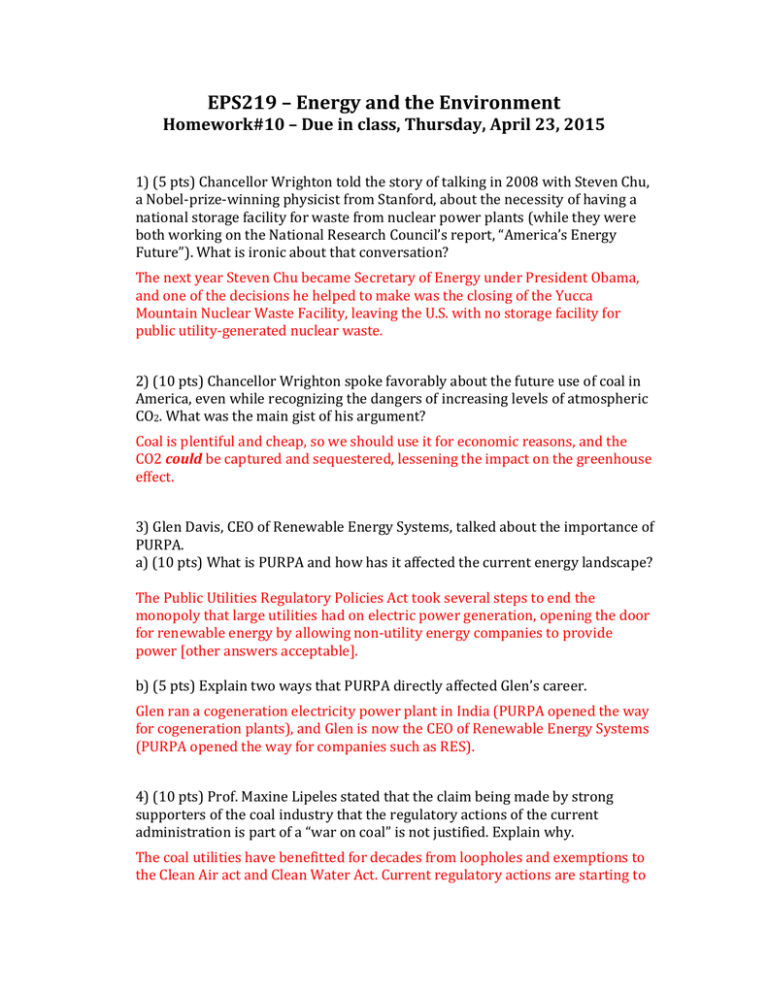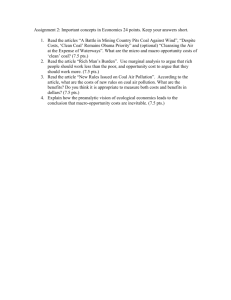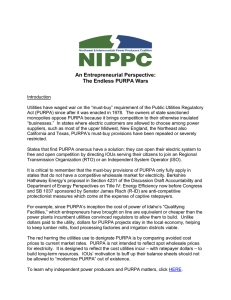HW10_ans
advertisement

EPS219 – Energy and the Environment Homework#10 – Due in class, Thursday, April 23, 2015 1) (5 pts) Chancellor Wrighton told the story of talking in 2008 with Steven Chu, a Nobel-prize-winning physicist from Stanford, about the necessity of having a national storage facility for waste from nuclear power plants (while they were both working on the National Research Council’s report, “America’s Energy Future”). What is ironic about that conversation? The next year Steven Chu became Secretary of Energy under President Obama, and one of the decisions he helped to make was the closing of the Yucca Mountain Nuclear Waste Facility, leaving the U.S. with no storage facility for public utility-generated nuclear waste. 2) (10 pts) Chancellor Wrighton spoke favorably about the future use of coal in America, even while recognizing the dangers of increasing levels of atmospheric CO2. What was the main gist of his argument? Coal is plentiful and cheap, so we should use it for economic reasons, and the CO2 could be captured and sequestered, lessening the impact on the greenhouse effect. 3) Glen Davis, CEO of Renewable Energy Systems, talked about the importance of PURPA. a) (10 pts) What is PURPA and how has it affected the current energy landscape? The Public Utilities Regulatory Policies Act took several steps to end the monopoly that large utilities had on electric power generation, opening the door for renewable energy by allowing non-utility energy companies to provide power [other answers acceptable]. b) (5 pts) Explain two ways that PURPA directly affected Glen’s career. Glen ran a cogeneration electricity power plant in India (PURPA opened the way for cogeneration plants), and Glen is now the CEO of Renewable Energy Systems (PURPA opened the way for companies such as RES). 4) (10 pts) Prof. Maxine Lipeles stated that the claim being made by strong supporters of the coal industry that the regulatory actions of the current administration is part of a “war on coal” is not justified. Explain why. The coal utilities have benefitted for decades from loopholes and exemptions to the Clean Air act and Clean Water Act. Current regulatory actions are starting to close some of those loopholes, making the coal industry subject to some of the same regulations that all other industries have been subject to for over 40 years. 5) (10 pts) The Clean Air Act places regulations limiting the concentrations of certain pollutants commonly emitted by coal-fired power plants. How have most coal-fired power plants been designed to avoid exceeding these limits? The plants have very tall stacks that release the pollutants so high off the ground that they disperse widely, often making the measured concentrations of pollutants below Clean Air Act standards. 6) (10 pts) In Bret Gustafson’s presentation, what aspect of American culture was exemplified by the old TV show, “The Beverly Hillbillies?” The American Dream that any American strike it rich and go from rags to riches, and that the oil industry is a good way to make this happen. 7) (10 pts) What country is the largest exporter of weapons? How is this connected to the Middle Eastern countries? The U.S., and we largely sell to countries in the middle east such as Saudi Arabia, as part of our insurance of maintaining a reliable flow of oil. 8) )(10 pts) Geothermal is a renewable form of energy. However, why is it that you could expect to get not more than a few decades of geothermal power out of a deep rock geothermal system? Pumping water into the hot rock cools it off, lowering the efficiency, and it takes a long time for the heat to flow back into the region. 9) a) (10 pts) Briefly explain how a residential geothermal system works. Because the ground stays at roughly the same temperature year-round, you can use the ground to reduce heating and cooling costs. In the summer, you can pump warm water into the ground to cool it off, reducing air conditioning costs. In the winter, you can pump cold water into the ground, allowing it to warm up, reducing water heating costs. b) (10 pts) Explain why this system would not work if you lived near the equator. You need the large seasonal swing between summer and winter for it to be efficient. Essentially, you are storing heat from summer and retrieving it in winter. At the equator, the temperature is roughly the same year-round.






